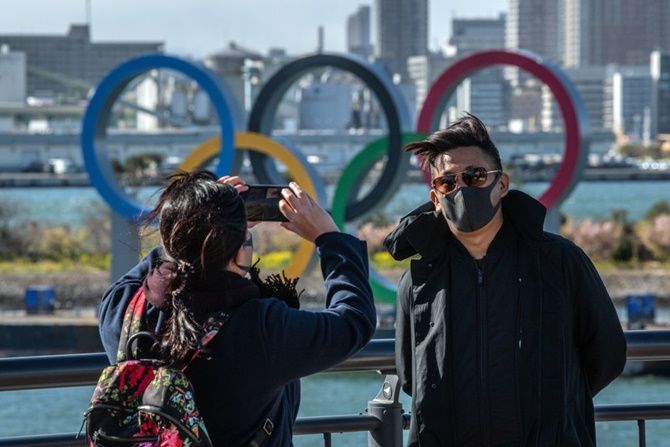
Japan’s Olympic minister said last week that the contract for the Tokyo 2020 Games 'could be interpreted as allowing a postponement,' sparking speculation that the Games may be delayed and angering the International Olympic Committee.
Minister Seiko Hashimoto has since reinforced the organisers’ message that the Games would go ahead as planned, but the controversy has brought into sharp focus the document underwriting the Olympics - and the implications it would have should they be affected by the coronavirus epidemic.
Taisuke Matsumoto, a sports law expert at Tokyo’s Waseda University, said the contract gives the IOC all the 'bargaining power.' He added that such 'one-sided' deals where the host city has little say are very common for large-scale sports events.
Here are the key provisions from the Host City Contract and additional documents signed by the IOC, the Tokyo 2020 organizers, the city’s metropolitan government and the Japanese Olympic committee:
* The Olympics Games and all relevant rights – including broadcasting, reproduction, and staging rights - are the exclusive property of the IOC.
* The organisers must protect the IOC from any damages or claims related to the organising of the Games. This means the organisers may compensate the IOC for the damages they suffer, as well as payments the IOC is asked to make by third parties such as Olympic sponsors or broadcasters.
* The IOC can make changes to the Olympic program at any time. Such changes may include adding or deleting sports. The organisers bear the cost of those changes.
* Only the IOC can cancel the Olympics. The reason for doing so could be one of the following:
- Tokyo is not in a state to host the Olympics, such as being in the midst of a war or civil disorder;
- The IOC believes that the safety of the participants would be seriously threatened;
- The Games are not held in 2020;
- The organisers breach the contract or any other applicable law
* It’s likely the IOC won’t trigger the termination clause, said Yoshihisa Hayakawa, lawyer and professor at Tokyo’s Rikkyo University. Instead, Japan would probably withdraw from hosting the Games out of consideration for the participants’ safety after discussions with the IOC behind the scenes.
* If the Games get scaled down, Hayakawa said, the IOC and the organisers can also always sign an additional contract.
* Lisbon-based Alexandre Miguel Mestre, lawyer specialising in sports law, said that if the Olympics were cancelled, it would probably be under the clause saying they can’t be held in 2020. Cancelling because the Games aren’t held in 2020 would be an objective decision, he said.
* If the IOC decides to cancel the Games, it would first ask the organisers to remedy the situation within 60 days.
* If the IOC is not satisfied with how the organisers improve the situation, then the IOC can cancel the Olympics.
* If the Olympics are cancelled, the organisers cannot make any claims against the IOC, or ask them to compensate for damages.
* If the Olympics are cancelled, the organisers would have to protect the IOC and its representatives from any third party claims.













 © 2025
© 2025